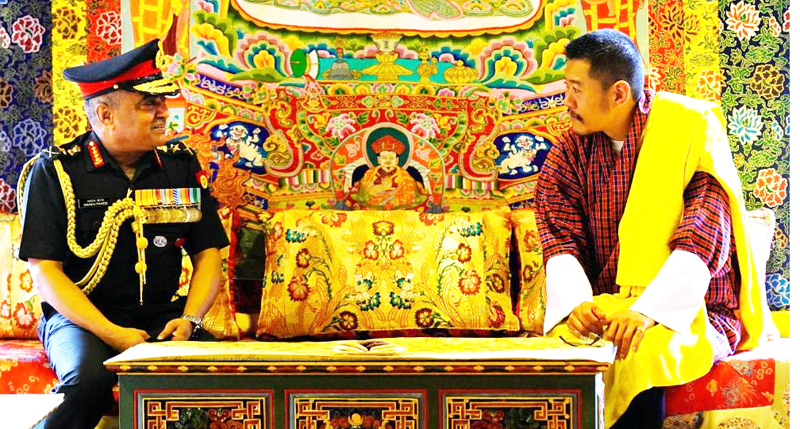
NEW DELHI, July 31: Chief of Army Staff Gen Manoj Pande has met Bhutanese King Jigme Khesar Namgyel Wangchuck and other top civil and military leaders of Bhutan with a focus on further boosting enduring strategic ties.
Gen Pande is on a visit to Bhutan in the backdrop of growing concerns in India over China’s relentless attempts to expand military infrastructure around Bhutanese territory in the Doklam plateau.
People familiar with Gen Pande’s engagements in Bhutan said regional defence and security challenges, Chinese activities in the plateau and adjoining areas and ways to further enhance bilateral defence cooperation figured in his talks in Thimphu.
The Army chief’s visit to Bhutan coincided with India’s decision to authorise the export of 5,000 metric tonnes of wheat and 10,000 metric tonnes of sugar to Bhutan as per Thimphu’s requirements.
Earlier this year, India restricted the export of the two commodities to strengthen India’s food security.
The Army chief called on the King on Saturday besides meeting Jigme Singye Wangchuck, the Fourth King of Bhutan.
“General Manoj Pande #COAS called on His Majesty the King of Bhutan Jigme Khesar Namgyel Wangchuck and discussed aspects of enhancing the enduring bilateral relationship between the two Nations,” the Army said in a tweet.
It said he was also accorded an “impeccable Guard of Honour” at Thimphu.
The people cited above said Gen Pande held extensive talks with his Bhutanese counterpart Lt General Batoo Tshering on all key issues including the overall situation in the Doklam tri-junction.
In 2017, the Indian and Chinese armies were locked in a 73-day stand-off at the Doklam tri-junction after China tried to extend a road in the area that Bhutan claimed belonged to it.
Gen Pande also met with the Indian officials engaged in capacity-building of Bhutanese military.
Gen Pande’s visit to Bhutan came days after new satellite images emerged showing China constructing a village East of the Doklam plateau on the Bhutanese side, a region that is considered important for India’s strategic interest.
After the images came out, the Ministry of External Affairs said India keeps a constant watch on all developments having bearing on national security and takes necessary measures to safeguard its interests.
In October last year, Bhutan and China signed an agreement on a “three-step roadmap” to expedite negotiations to resolve their festering boundary dispute.
Bhutan shares an over 400-km-long border with China and the two countries have held over 24 rounds of boundary talks in a bid to resolve the dispute.
The Doklam tri-junction is considered important from the point of view of India’s security interests.
The India-China stand-off in the Doklam plateau in 2017 even triggered fears of a war between the two nuclear-armed neighbours.
Bhutan said the area where China attempted to build the road belonged to it and India supported the Bhutanese claim.
India had strongly opposed the construction of the road at the Doklam tri-junction as it would have impacted its overall security interests.
The India-China face-off was resolved following several rounds of talks. (PTI)

